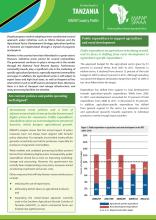Land Library Search
Through our robust search engine, you can search for any item of the over 73,000 highly curated resources in the Land Library.
If you would like to find an overview of what is possible, feel free to peruse the Search Guide.
/ library resources
Showing items 1 through 9 of 13.Land, as a factor of production, has a vital role within the agricultural sector compared with other sectors.
Despite the popularity of agricultural land markets as a research topic, a current literature review on price drivers on agricultural land rental markets is missing, which is crucial in order to gain an overview of the status quo.
While agrarian change has been a recurrent theme in Ghana’s endeavor for economic development, questions on how land resources should be managed to ensure prompt attainment of economic growth remain unanswered.
Food is wasted throughout the entire food supply chain—from agricultural production to the household level. This has negative impacts on natural resources and the environment. At the same time, food waste is undermining the global target of food security.
The NAP 2013 aims at addressing challenges that continue to hinder the development of the agricultural sector; these include low productivity; over dependence on rain-fed agriculture; inadequate agriculture support services; poor infrastructure; weak agro-industries; low quality of agricultu
An Act to provide the establishment of the National Irrigation Commission; to provide for the development,operation and maintenance of irrigation and drainage systems; to provide for effective implementation of the National Irrigation Policy, the National Irrigation Development Strategy and to pr
This report presents findings from the first agricultural policy review conducted by the Monitoring African Food and Agricultural Policies (MAFAP) project in the United Republic of Tanzania. The report reviews key economic issues and the main policy decisions affecting the agricultural sector.
FAO is working with national partners to set up a sustainable system for monitoring the impact of food and agricultural policies for the first time in Africa. Through MAFAP, FAO has developed common indicators for monitoring key commodities and public expenditure in agriculture.
Despite progress made in adopting a more coordinated sectoral approach under initiatives such as Kilimo Kwanza and the Agricultural Sector Development Strategy, agricultural policies in Tanzania are implemented through a myriad of programs and projects.








